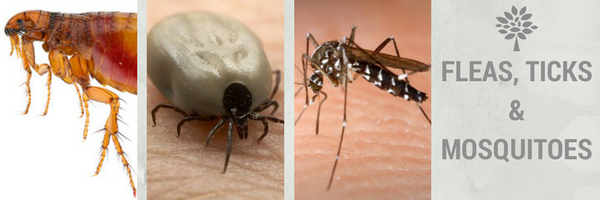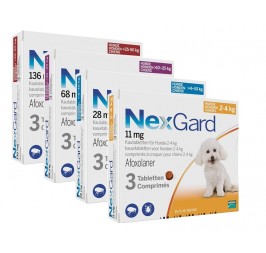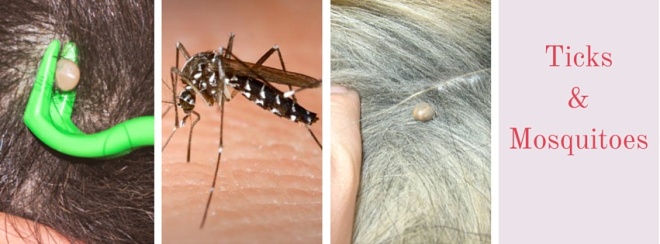Fleas, Ticks, Mosquitoes. OUCH!
What does warm weather, damp corners and dark shadows add up to? You guessed it. Fleas, ticks and mosquitoes. Lucky us.
Unfortunately for our pets, both ticks and mosquitoes can carry potentially fatal diseases that can be passed on. Ticks for example, can carry Lyme disease and mosquitoes can carry heartworms.
So, how do we deal with these insects? That’s where we come in.
There are some wonderful products available for our pets to make sure that these diseases aren’t transferred from said insect to your pet. We have both chewable and topical medications to help control insects on your pet. The topicals we carry produce what is called a ‘Hot-foot’ effect. When a tick, flea or mosquito touches your pet’s skin it causes a burning sensation on the bottom of the insect’s feet causing them to hop off of your pet and not even have a chance to feed. This medication is then distributed through their body and kills them.
The chewables work by traveling through your pets blood stream and when an insect feeds, it is automatically ingesting this medication causing them to die. Both products work exceptionally well at controlling fleas and ticks. With regards to heartworm, transferred by mosquitoes, you do need a different medication.
Blood testing is strongly encouraged yearly for tick-borne diseases and mandatory for heartworm prevention. Many tick-borne diseases can be treated with a short course of antibiotics if detected early. Commonly symptoms of tick-borne diseases appear vague and often go unnoticed for long periods of time. Often many pet owners don’t know their dog is suffering from a debilitating tick disease until it is too late.
Symptoms of progressive tick-borne diseases can include but are not limited to;
- joint pain and inflammation
- low-grade persistent fever
- swelling at bite site
- loss of appetite
- spontaneous and shifting lameness
- reluctant to move
- fatigue
- lethargy
- weight loss, may or may not, include muscle wasting
- depression
- neck pain
- neurological signs
- bruising on gums or belly
- nosebleed
- discharge from eyes
- vomiting
- generalized weakness
Where do ticks live?
Ticks are typically found in forested areas and any overgrown areas including our own backyards. They don’t typically like sunny short-grassed areas but that’s not to say they can’t be there.
Keep your lawn and outdoor play areas safe. Keep shrubs and grass trimmed. Clean up any leaves or debris, especially underneath bushes. Limit shrubs and plants from areas your children and/or pets frequent. i.e. swing-sets, outdoor dining areas, etc. Keep areas around sheds and other buildings free of debris especially in shady areas.
For more information and a map of tick disease in our area visit www.dogsandticks.com
Many people already know that fleas can live in our households, but did you know, so can the brown dog tick? These ticks will live and reproduce in our houses just like fleas and typically need an exterminator to get rid of. Topical preventives and checking your pets skin will help prevent these pesky creatures from moving into your home. We have also seen an increase of Deer Ticks in the Brampton area. These ticks are the carriers of Lyme disease.
Walk-in blood testing is available for your pets that do not need to see a veterinarian for any other reason.
AVAILABLE WALK IN TESTING
May 1st – May 31st
Mon. 9:00-12:00 2:00-8:00
Tues. 9:00-12:00 2:00-7:00
Wed. 9:00-12:00 2:00-8:00
Thurs. 9:00-12:00 2:00-7:00
Fri. 9:00-12:00 2:00-7:00
Please note: Walk-Ins are NOT available during 12:00-2:00 pm nor on Saturdays
Cats can also be tested and placed on preventative. Due to the life-cycle of Feline Heartworm, many cats may have the parasite without showing any symptoms. Consider treating any cats that go outdoors, travel to the USA and/or southern Ontario or that have a chronic cough or wheeze.
If you notice a tick on yourself, a family member or pet, please use extreme caution when removing it or ask a professional to remove it for you. Many times the head can be left in the skin if not done properly.
Here are some of the products that we carry;







 There’s a new product available in Canada this year which the staff at
There’s a new product available in Canada this year which the staff at